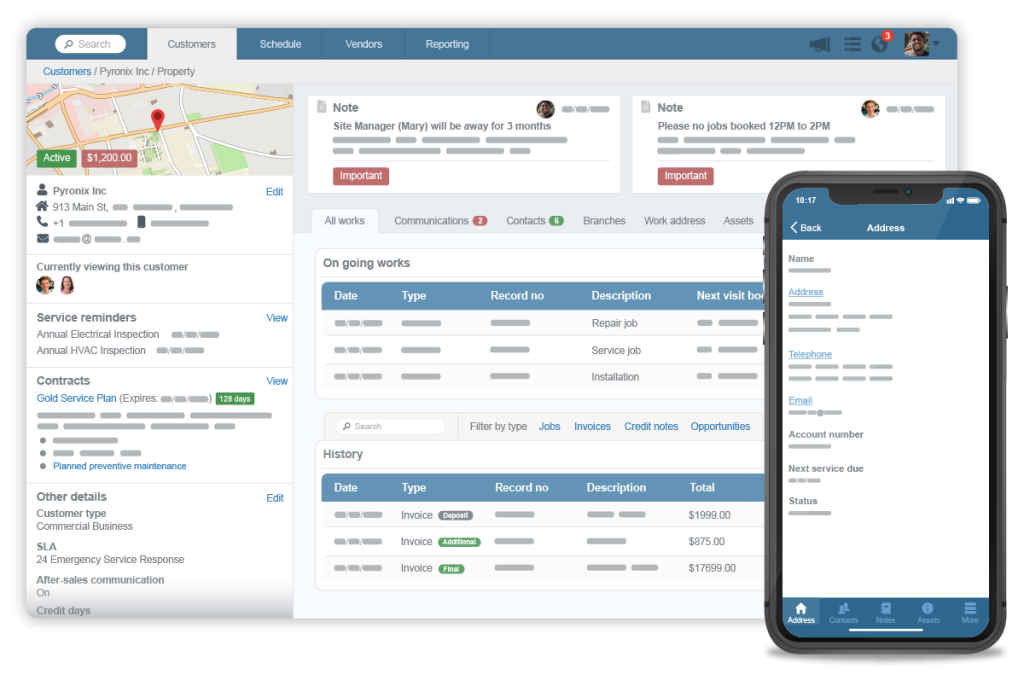Centralized Client Data
Our CRM database collates customer, job, and communication records into one, eliminating paper trails.
Our cloud-based customer database software allows you to manage customer records from anywhere. You can manage customer accounts, arrange jobs and appointments, and handle communications, all while improving your overall business strategy and organization.


Our CRM database collates customer, job, and communication records into one, eliminating paper trails.
All Commusoft data is safely stored in the cloud, so you don't have to worry about losing crucial customer data.
Send emails, text messages, log phone calls, add call notes, and see all past communication history.
Commusoft's customer database is available 24/7 on both web and mobile applications.
Automate tasks like confirmations and reminders, service reminders, and customer feedback requests.
We give you the flexibility to manage customer information from anywhere.
David
Commercial Director
Ayrshire Tree Surgeons
What Commusoft has allowed us to do is to track repeat customer business and allow customers, who have had a great experience the year before, or the year before that, we’ve been able to match that against the same squad, so there’s continuity for that customer.
Many field service businesses handle an array of customers and properties. Our customer database keeps all relevant and necessary information, such as service contracts, job reports, and contact information in one location. No more mishandled paperwork or missed communications; admins will have access to everything they need.

Please customers with effective communications. Pull their specific problems, and job history straight from Commusoft’s customer records. Plus, your team can create custom fields, which enable you to record information, such as parking details. You can easily sort all customer and job information; your team can log phone calls in our system, add notes, and see a history of all prior communications.

Commusoft makes it easy to jump in and see all your customers right away. Our customer database system keeps all relevant and necessary information accessible from one location. Your admin team won’t dig through paperwork or paw through files ever again. Everything they need to know is here.

Let Commusoft take care of your repetitive tasks. This includes appointment confirmations, service reminder messages, contract renewals, and customer feedback requests, for example. With monotonous tasks handled, your admins can concentrate on higher-value activities that will have more impact on your business.

Collect and store valuable information
Commusoft makes it easy to collect the customer and job information that's important for your business. Whether it's files, photos, or technical info, we make sure it's all easy to find. Further, your team can create and assign custom fields to customer records.
Save detailed asset records for all customers
Commusoft can help your team record and store essential asset maintenance information for each customer you serve. Technicians can access and update data from the field, helping them complete jobs quicker.
Guarantee customer and job information is securely stored
Commusoft is a cloud-based CRM that uses role-based security. We use network drive storage to host critical client data, encrypting data at rest. Customer and job details are safe with us.
Save time by automating personalized communications
Creating message templates ensures your team can quickly send the right message in any occasion. Plus, you can customize tagging fields, which will automatically populate with the customer details. Adding an extra personal touch has never been easier!
Customer database software is a digital solution that organizes vital customer records while replacing the need for traditional paper files. This system helps admin teams boost efficiency and accuracy while helping customers.
The ability to quickly pinpoint information means your team can help more customers quicker. This seems small, but great customer experiences pay off. Quick responses and organized records can improve your company’s reputation, making it easier to win more business.
Our customer database centralizes important customer details and information, saving your team valuable time when they need to quickly locate what they need.
A quick response rate and knowledge about their inquiry can impress customers while showing them you care!
For a growth-centered business, customer experience is everything. After all, happier customers lead to better word of mouth about your business, increasing new and repeat appointments.
Ready to see Commusoft in action? Schedule a call with our team today!
Commusoft is so much more than a CRM; we’re an all-in-one job management platform offering solutions including technician scheduling, customer service contracts, inventory management, invoicing, financial reporting, and much more.
Basic customer database software is a digital solution that replaces the need for traditional paper files. Commusoft does this and takes it further. We centralize vital customer records in one place, meaning your team can respond quicker, arrive on-site sooner, and bring home profits faster.
Our customer database software pricing depends on how many licenses you need, and which of our powerful plans you choose.
Learn more about each of our plans ➞
Meeting SLAs and contracts is essential for all field service businesses. With Commusoft’s service contracts software, your team can manage and oversee all agreements.
Please customers by keeping them in-the-loop with automated emails, texts, or letters, and updates like “on-the-way” messages.
Empower your team to track all works from the office, or the road. Job sheets, reports, custom forms, and more, all sync in real time to the office, so nothing falls through the cracks.
Empower your staff with a complete overview of your business with 40+ preconfigured reports, a data visualization dashboard, and customizable reports.

Effectively managing customers is essential for businesses that want to scale. Discover the true impact of customer management on your business's profits!

This ultimate checklist to managing your database has everything you need to create great customer experiences, while ensuring your data is organized and easy to access.

"This software is enabling our day-to-day processes to run smoothly…we’ve been able to leap forward instead of taking one step at a time."